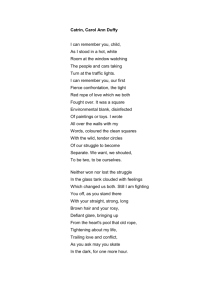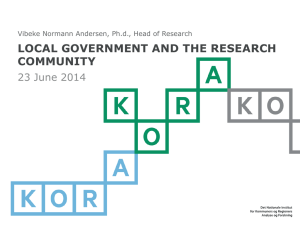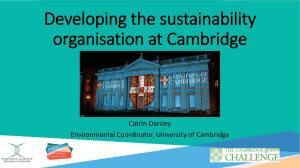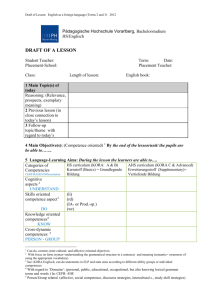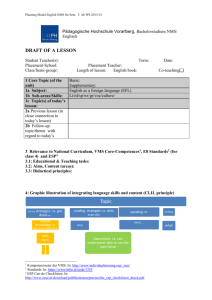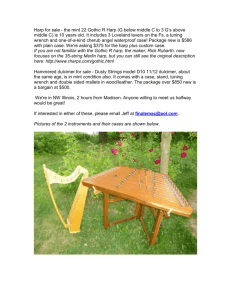Songlines Magazine August / September 2014 feature
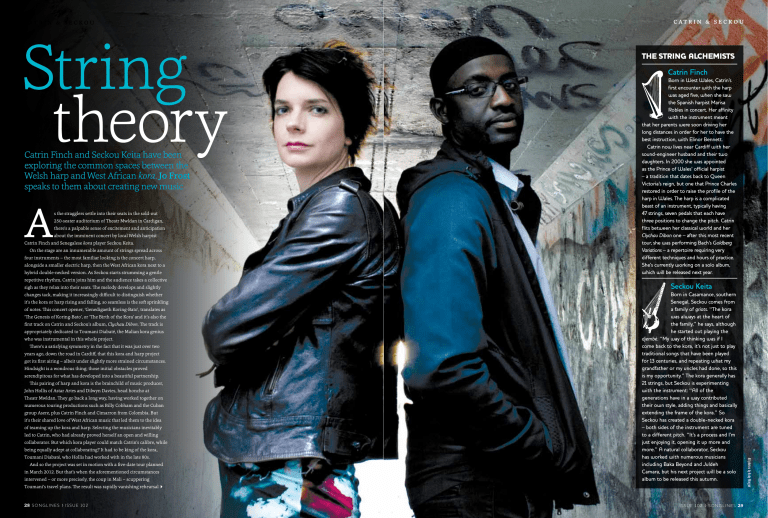
c a t r i n & S e c k o u
String
Catrin Finch and Seckou Keita have been exploring the common spaces between the
Welsh harp and West African
kora
. Jo Frost speaks to them about creating new music
A s the stragglers settle into their seats in the sold-out
250-seater auditorium of Theatr Mwldan in Cardigan, there’s a palpable sense of excitement and anticipation about the imminent concert by local Welsh harpist
Catrin Finch and Senegalese kora player Seckou Keita.
On the stage are an innumerable amount of strings spread across four instruments – the most familiar looking is the concert harp, alongside a smaller electric harp, then the West African kora next to a hybrid double-necked version. As Seckou starts strumming a gentle repetitive rhythm, Catrin joins him and the audience takes a collective sigh as they relax into their seats. The melody develops and slightly changes tack, making it increasingly difficult to distinguish whether it’s the kora or harp rising and falling, so seamless is the soft sprinkling of notes. This concert opener, ‘Genedigaeth Koring-Bato’, translates as
‘The Genesis of Koring-Bato’, or ‘The Birth of the Kora’ and it’s also the first track on Catrin and Seckou’s album, Clychau Dibon. The track is appropriately dedicated to Toumani Diabaté, the Malian kora genius who was instrumental in this whole project.
There’s a satisfying symmetry in the fact that it was just over two years ago, down the road in Cardiff, that this kora and harp project got its first airing – albeit under slightly more strained circumstances.
Hindsight is a wondrous thing; those initial obstacles proved serendipitous for what has developed into a beautiful partnership.
This pairing of harp and kora is the brainchild of music producer,
John Hollis of Astar Artes and Dilwyn Davies, head honcho at
Theatr Mwldan. They go back a long way, having worked together on numerous touring productions such as Billy Cobham and the Cuban group Asere, plus Catrin Finch and Cimarron from Colombia. But it’s their shared love of West African music that led them to the idea of teaming up the kora and harp. Selecting the musicians inevitably led to Catrin, who had already proved herself an open and willing collaborator. But which kora player could match Catrin’s calibre, while being equally adept at collaborating? It had to be king of the kora,
Toumani Diabaté, who Hollis had worked with in the late 80s.
And so the project was set in motion with a five-date tour planned in March 2012. But that’s when the aforementioned circumstances intervened – or more precisely, the coup in Mali – scuppering
Toumani’s travel plans. The result was rapidly vanishing rehearsal
28 s o n g l i n e s
›
i ss u e 1 0 2 c a t r i n & S e c k o u
the string alchemists
Catrin Finch
Born in West Wales, Catrin’s first encounter with the harp was aged five, when she saw the Spanish harpist Marisa
Robles in concert. Her affinity with the instrument meant that her parents were soon driving her long distances in order for her to have the best instruction, with Elinor Bennett.
Catrin now lives near Cardiff with her sound-engineer husband and their two daughters. In 2000 she was appointed as the Prince of Wales’ official harpist
– a tradition that dates back to Queen
Victoria’s reign, but one that Prince Charles restored in order to raise the profile of the harp in Wales. The harp is a complicated beast of an instrument, typically having
47 strings, seven pedals that each have three positions to change the pitch. Catrin flits between her classical world and her
Clychau Dibon one – after this most recent tour, she was performing Bach’s Goldberg
Variations – a repertoire requiring very different techniques and hours of practice.
She’s currently working on a solo album, which will be released next year.
Seckou Keita
Born in Casamance, southern
Senegal, Seckou comes from a family of griots . “The kora was always at the heart of the family,” he says, although he started out playing the djembé . “My way of thinking was if I come back to the kora, it’s not just to play traditional songs that have been played for 13 centuries, and repeating what my grandfather or my uncles had done, so this is my opportunity.” The kora generally has
21 strings, but Seckou is experimenting with the instrument: “All of the generations have in a way contributed their own style, adding things and basically extending the frame of the kora.” So
Seckou has created a double-necked kora
– both sides of the instrument are tuned to a different pitch. “It’s a process and I’m just enjoying it, opening it up more and more.” A natural collaborator, Seckou has worked with numerous musicians including Baka Beyond and Juldeh
Camara, but his next project will be a solo album to be released this autumn.
i ss u e 1 0 2
›
s o n g l i n e s 29
time prior to the debut concert. But, as chance would have it, Hollis also happens to manage Seckou Keita, who was drafted in at very short notice to work out a repertoire and rehearse with Catrin.
As we chat in a sunlight room in Theatr Mwldan prior to their concert in May, Seckou recalls this defining moment. “When John called me, I was in Rome doing a performance for the UN. He said
‘you’ve got to come because this is really important.’ I just thought ‘OK,
I’m free, I can come.’” So Seckou and Catrin met and started the process of putting together a show – without one of its key players. In the end
Toumani arrived, four hours before the first concert – and after he’d had his fish and chips. Catrin laughs as she reminisces: “I was like, hello, you’re five days late, and now fish and chips! Yes, at that point in time, I wasn’t thinking that we would be here today!”
Despite the inauspicious start, the first concert was, by all accounts,
“electric.” Seckou was graciously invited to guest with Toumani and
Catrin at one of the gigs and the tour was a resounding success. Off the back of this, an album was planned but at this point Toumani, for various reasons, stepped away and up rose Seckou again. Catrin seems sanguine as she talks about this time: “The thing is about these kind of collaborations is that sometimes it works and sometimes it doesn’t. Myself and Seckou… we kind of clicked. That’s how music is really; you click with people and you click with other performers. So then we went on.”
And on indeed they went, with some considerable success too.
The ensuing album was released last August and since then, it’s received numerous rave reviews; it was chosen as one of Songlines
Best Albums of 2013; it won fRoots Album of the Year; Gillian Clarke
(National Poet for Wales) selected a track on Desert Island Discs; the
“ The thing is about these kind of collaborations is that sometimes it works and sometimes it doesn’t. Myself and Seckou, we clicked”
pair were nominated in the BBC Radio 2 Folk Awards; their showcase at WOMEX in Cardiff was hugely oversubscribed; and in April they were announced as winners of the 2014 Songlines Cross-Cultural
Collaboration Award. The list of accolades is likely to keep growing too, given that the album has only just been released in the US and Europe.
The beauty of this collaboration and its popularity, which continues to gain momentum, is there seems to be an enduring appeal to it, unlike so many others that pass in a flash and, more often than not, are relegated to the back catalogue of ‘Interesting One-off Collaborations.’
The pairing of Wales and West Africa might seem incongruous, yet the harp and kora definitely have intriguing similarities, ones that writer Andy Morgan elucidates on in his excellent book Finding the
One: The Strange and Parallel Lives of the West African Kora and the
Welsh Harp (reviewed on p83). “I guess the thing is, it all came from the same place originally,” says Catrin. “It’s just that it has developed in different places over hundreds of years. But it’s still the same thing and that’s what’s been amazing about this project. It’s two cultures that have crossed but it’s amazing how similar they are.”
“It kind of makes sense, they’re both harps and it was obvious, staring us all in the face really,” she continues. But then she admits she took some time to come round to appreciating the kora when the idea was first mooted. “I’d not really had any experience of it, or African music in general,” she says. “When I first listened to the kora, it all sounded a bit samey!” she laughs. “My worry was really how I would contribute to something that was not hallucinogenic… but it puts you in a zone and is trancey, and I wasn’t sure I could be trancey!”
Catrin has done a fair bit of collaborating outside the classical world and it’s clearly something she relishes. “Even though you’re a classical i ss u e 1 0 2
›
s o n g l i n e s 31
c a t r i n & S e c k o u musician, it doesn’t mean you haven’t improvised and experienced other things. I guess I’ve always been interested in all kinds of music, so when I was at the Academy [Royal Academy of Music], I was doing the jazz course for non-jazzers. It’s just a different outlook really; it’s all about what you enjoy as a musician.”
In contrast to Catrin’s classical and academic background, Seckou comes from a long lineage of musicians from Casamance in southern
Senegal and doesn’t read music. “I can recognise some of it but it’s mainly dots,” he laughs. “So, yes, my way is just hearing and memory.”
“You have to go in with a very open mind,” explains Catrin. “You have to put your music book away, because when we first sat down, I had my little manuscript and I was trying to write down some of the stuff Seckou was playing and it soon became obvious that that wasn’t a working solution. So we closed the book and used our ears. It’s not a process you can rush particularly; it happens sitting together for a few hours in a room, playing it over and over again and you clock the ideas that work and the ones that don’t. Then you piece it together like a jigsaw puzzle.”
They talk about how they approach working together and how they’re constantly trying out new ideas. “Melodies start coming, flowing,” explains Seckou, as Catrin continues: “then one of us will start playing something and there’ll be a moment when it’s like, yes! That’s great!” The time spent rehearsing and soundchecking has been particularly fruitful as they’ve come up with several new tunes such as ‘Combo Celtaidd’ –
celtaidd is the Welsh word for Celtic and combo means ‘mist’ in Mandinka
– so ‘Celtic Mists.’ It becomes obvious that here are two musicians who, despite their polar-opposite backgrounds, have found a creative common ground. There’s a great deal of joking and laughter and an ease
Here are two musicians who, despite their opposite backgrounds, have found a creative common ground
in each other’s company that is also very evident when they perform.
Onstage they’re the perfect foil for each other: Catrin sits to the left of Seckou so that she can peek at him through her strings, occasionally giving him a cheeky, complicit smile. Seckou frequently breaks into
Cheshire Cat-like beams of appreciation when something emerges that tickles his fancy. What makes it such an enjoyable spectator experience is the evident mutual respect and admiration for each other’s playing.
Besides their obvious skillfulness, there’s a simplicity and fluidity to the music that is beautifully serene – like a musical balm. Each performance has a thrilling momentum to it as they vie with each other to create more and more innovative sounds, like Catrin’s percussive harp slapping or the way she drags her nail down a string to create a most unharp-like sound.
It feels as if they’re being swept along by the music they’re conjuring up.
They both seem genuinely surprised by the reactions they’ve been getting. Catrin recalls playing in Cardiff last October: “The interest when we did a showcase at WOMEX was insane… bonkers,” she says. “I have been really surprised. It’s funny, we’ve both done so many different things throughout our pretty short careers so far, but this has really grabbed people’s imagination and people love it,” she says, looking mildly bemused.
It’s certainly true that without any great fanfare, there’s been gradual, seemingly comprehensive acclaim for these two musicians and the beautiful music they’re creating. The album and their recent showcase in Paris went down a storm with the French press, and
Robin Denselow’s review in The Guardian of their May gig in London, described it as ‘one of the classic concerts of the year.’ There’s a tendency to over-analyse music; to attempt to categorise it and try to explain its appeal. Producer Hollis sums up the music pretty succinctly by saying
“it’s just got soul.” One particularly happy punter was heard to say after one of the gigs: “I can’t find the words to describe how profound an effect this has had on me tonight. The only thing I can say is, to borrow a phrase that John Lennon used, ‘they’ve come up with new music!’”
As with most collaborations, there’s a bunch of people behind the scenes who are instrumental in its success. “There’s a really great team behind us,” says Seckou. In this case, it’s ‘Team Dibon,’ so named by
Theatr Mwldan’s star marketing manager Tamsin Davies. “I think the main thing with this is that it’s just a fun bunch of people and we’re all having a good time,” says Catrin. “And we enjoy it!” Seckou agrees.
“You’ve got to enjoy it,” says Catrin, “and it will go where it will go, and it will last how long it will last.” Seckou nods in agreement, “exactly.”
+ BOOK Finding the One is reviewed in this issue, p83
+ POdcast Hear Jo Frost’s report and music on this issue’s podcast
+ datEs Catrin & Seckou will be at Folk by the Oak, WOMAD,
Cambridge and Shambala festivals this summer and have a UK tour in October. They will also perform at the Songlines Music Awards concert at the Sage Gateshead on November 6. See p12 for details
32 s o n g l i n e s
›
i ss u e 1 0 2
